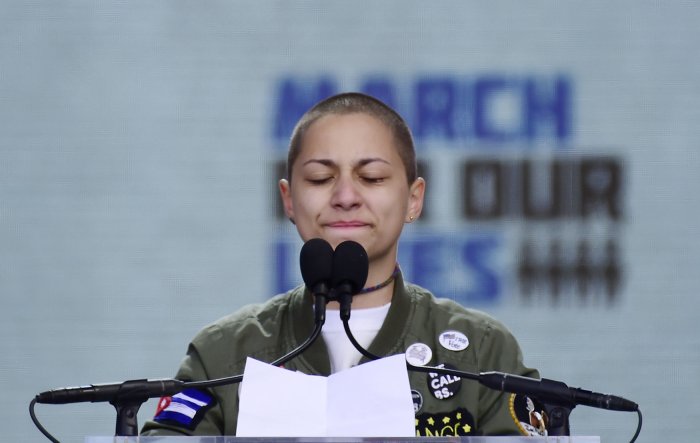<< Show Caption >>
Dec. 27 (UPI) -- When a teenager opened fire on students at Marjory Stoneman Douglas High School in Florida earlier this year, young survivors sought to make this mass shooting different. They worked to make their voices heard and change laws.
Seventeen people died on Valentine's Day -- 13 students and three faculty members.
The Parkland, Fla., shooting came nearly two decades after 13 people died at Columbine High School, five years after 27 mostly elementary school students died in Newtown, Conn., and months before 10 students died at Santa Fe High School in Texas.
In Parkland, the teen survivors were not satisfied with everyone's "thoughts and prayers." Declaring, via hashtag, #Enough and #NeverAgain, they rallied. Students around the world joined them. Policymakers, parents and celebrities supported them.
They marched for their lives, bringing more than 1 million people to Washington, D.C. -- and dozens of other locations throughout the country -- calling for stronger gun control.
Some states moved immediately to change laws.
"A lot of policies that we had been working on as a movement for years were pushed across the finish line because of Parkland," said Allison Anderman, managing attorney at the Giffords Law Center to Prevent Gun Violence.
In the months since the Parkland shooting, 27 state legislatures passed 67 gun-control laws, the most in a single year since the Sandy Hook shooting in 2012, an analysis from the Giffords center indicates. The number is more than three times the 20 measures passed in 2017, The New York Times reported.
Of the gun-control measures passed, nine aim to keep guns out of the hands of domestic abusers, eight targeted bump stocks and other devices that increase firing speed, eight were extreme risk protection orders in which firearms can be confiscated from at-risk individuals, seven increased background checks, six tightened concealed carry laws and eight provide funding to urban gun violence prevention programs.
New Jersey passed the most measures, including a six-bill package previously vetoed by former Gov. Chris Christie. New Gov. Phil Murphy signed an extreme risk protection order act and laws on background checks, concealed carry permitting and magazine capacity.
In Florida, where students marched on the Capitol, Gov. Rick Scott signed into law a $400 million package of legislative reforms for school security, mental health and gun control. The legislation banned the use of bump stocks, increased the minimum rifle purchasing age from 18 to 21, and instituted a three-day waiting period on all firearm purchases.
A Democratic attempt to include an amendment banning all assault weapons was unsuccessful.
Oregon was the first state to enact gun restrictions after the Parkland shooting, banning firearm ownership for people convicted of domestic violence, even if the victim isn't a spouse, closing the so-called "boyfriend loophole."
In Rhode Island, Gov. Gina Raimondo signed an executive order allowing law enforcement agencies to consider "all red flags, including recent threats of violence made in person, in videos and on social media and take all available legal steps to remove firearms from any person who poses a threat to themselves or others." The state also banned bump stocks and passed an extreme risk protection order law.
In April, Vermont Gov. Phil Scott signed into law three bills that contain gun-control measures -- expanding background checks, banning bump stocks, limiting rifle magazines to 10 rounds and raising the age limit to buy firearms to 21. He also signed a bill to remove guns from people cited or arrested for domestic assault.
In Delaware, Gov. John Carney signed the Beau Biden Gun Violence Protection Act on April 30. Named for former Vice President Joe Biden's late son, the law allows police to seize weapons from those deemed a danger to themselves or others.
"This year, Americans of all ages and from all backgrounds demanded action from lawmakers to make communities safer from gun violence," Anderman said. "Legislatures responded by standing up to the gun lobby's repeated attempts to weaken gun laws and listening to people who want progress on this issue. These victories build on the lifesaving bills we've helped pass over the past few decades and because of this momentum, more Americans in all areas of the country will be better protected from gun violence."
On the federal level, President Donald Trump's administration announced Dec. 18 a ban on bump stocks.
The Giffords report, released Dec. 14, also said there was a drop in the number of measures loosening restrictions on guns after Parkland, a reduction by about half from 2017, from 19 to nine.
Everytown for Gun Safety, a gun-control group organized by former New York City Mayor Michael Bloomberg, said state lawmakers voted against 90 percent of legislation by the National Rifle Association. The organization also said it endorsed candidates in 43 midterm races against NRA-backed candidates, and 33 candidates who support gun-control won.















